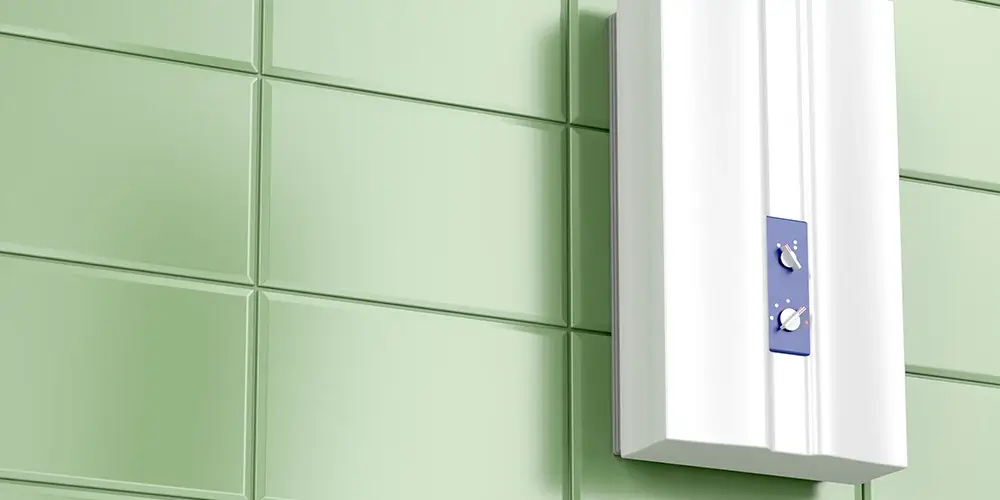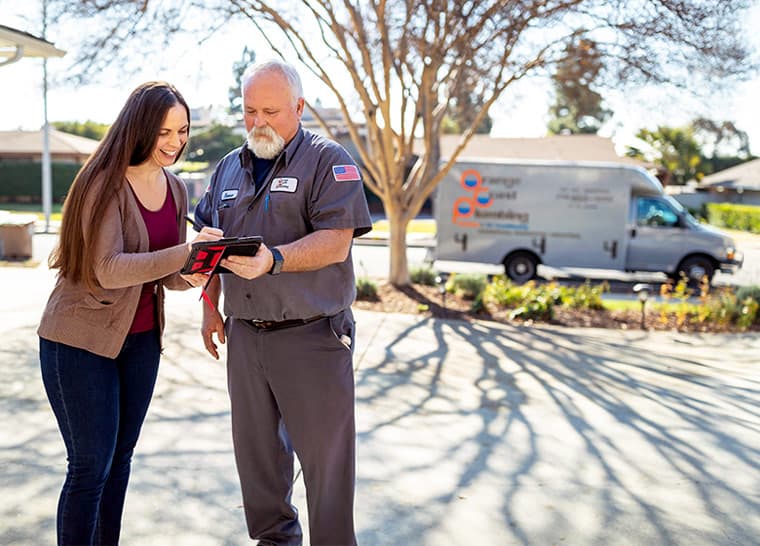Tankless water heaters were invented more than 90 years ago in post-WWI Germany.
Surprised? So were we when we looked it up.
Their primary benefit is a virtually unlimited supply of hot water on demand. They don’t store hot water but use powerful heating elements to raise the temperature of water rushing through.
The technology languished for several decades, but in 1970, with the introduction of modernized designs, tankless heaters became a viable alternative to standard tank water heaters. They arrived just in time for the Brady Bunch — that family of eight (nine if you include Alice) who needed a lot of hot water.
The 1990s were a golden age of water heater innovation, tankless included. Hot water circulation systems — another way of delivering on-demand hot water — also made their commercial debut.
Only in the past few years have tankless water heaters gained traction in the USA. They’re already well-established in parts of Europe and Asia because they offer several significant advantages over conventional tank heaters.
Google Trends shows US search interest in “tankless water heater” peaking in 2021. In Germany, France, and Japan, the same search term translated spiked in 2004. Limited living space and high energy costs in Japanese and Western European cities made tankless heaters an attractive choice at a time when Californians were paying only $1.88 at the gas pump.
Benefits of Tankless Water Heaters (the Pros)
So why are so many Orange County residents now taking the tankless plunge? Aside from the obvious benefit of on-demand hot water?
Ever-tightening water restrictions and rising energy costs are top-of-mind for many Californians. And in these two departments, tankless heaters excel.
- Because tankless water heaters are installed close to their point of use, hot water arrives almost immediately. Very little cold water is wasted as you wait for hot water to reach the tap.
- According to Energy.gov, tankless heaters can be “24%–34% more energy efficient than conventional storage tank water heaters.”
- Tankless water heaters are compact. There’s no water storage tank, and high-powered heating elements are encased in a box small enough to fit almost anywhere. Many homeowners install them outside, close to their kitchen or most-used bathroom.
- Tankless water heaters are reliable. They don’t rust or leak like tank systems and require little maintenance.
- Tankless water heaters are durable. They can last twice as long as conventional tank heaters.
- Tankless heaters deliver a virtually unlimited supply of hot water. Yes, it’s possible to exceed their capacity, but only if you try extra hard.
Cons of Tankless Water Heaters
Why doesn’t everyone go tankless then? It seems like a no-brainer in a drought state like California!
The main barrier is cost.
- Tankless water heaters have a higher up-front cost than conventional storage tank systems. Installation is complex, and depending on the model, the installation may require a larger gas line or additional electrical wiring.
- Tankless heaters need a specific flow rate to operate correctly, and this can be difficult to achieve in some buildings.
- Tankless heaters must be descaled every two or three years to remove mineral deposits in the heat exchanger. If you don’t descale your tankless heater on schedule, it will lose efficiency and eventually fail. As an FYI, conventional tank water heaters should be descaled on a similar schedule.
Tank vs. Tankless Water Heaters
The main selling point of tankless water heaters is unlimited, on-demand hot water. A tankless heater will cycle on only when you need hot water; nothing remains in the tank to corrode.
In an Orange County home, hot water from a conventional heater can travel through 80 feet or more pipe before reaching a shower nozzle or bathtub. And the heater takes up a closet-sized storage area. A tankless heater eliminates both problems.
Standard tank systems are cheaper to purchase, but you’ll pay for them with higher monthly water and energy bills, shorter appliance life, and the risk of leaks and tank collapse.
However, homes with old electrical systems, gas lines, and water lines may need considerable upgrades to accommodate a tankless water heater, making a tank unit the best choice.
Gas vs. Electric Tankless Water Heaters
California State government is doing its best to phase out gas appliances. Most new Southern California homes are now all-electric.
“In its ongoing effort to slash ozone pollution, the California Air Resources Board (CARB) voted Thursday to ban the sale of new gas furnaces and water heaters beginning in 2030. Homes will be required to install zero-emissions alternatives, like electric heaters.” (Source: capradio.org)
Call Us for a Free Estimate
Are you considering a tankless hot water system for your home or business, but find the choices overwhelming? Do you wonder if your building is suitable for a tankless unit?
Talk to us at Orange Coast Plumbing. We’ve installed hundreds of tankless heaters for Orange County homes and businesses, and can help you select a model that makes sense for your needs and budget. We’ll discuss other options as well, including hot water recirculation, which has a lower up-front cost.
All consultations are free; there’s never an obligation or even pressure to buy.
Our plumbers are licensed, certified, and trained to install and maintain all the latest and greatest water heating systems.
FAQs: Tankless Water Heater Pros & Cons
Q: What are the advantages of a tankless water heater?
Tankless water heaters provide continuous hot water on demand, take up less space than their tanked counterparts, and can reduce energy consumption by 24% to 34% for homes that use 41 gallons or less of hot water daily.
Q: How do tankless water heaters save energy?
Tankless water heaters avoid the standby energy losses associated with traditional tank water heaters. They heat water directly only when it’s needed, leading to energy savings.
Q: Can tankless water heaters supply hot water for an entire house?
Modern tankless water heaters are designed to supply enough hot water for most homes. However, the exact capacity needed depends on the household’s simultaneous hot water requirements.
Q: What’s the lifespan of a tankless water heater compared to a traditional water heater?
Tankless water heaters typically last up to 20 years or more, compared to traditional tank water heaters, which usually last between 10 and 15 years.
Q: Are tankless water heaters environmentally friendly?
Thanks to their energy efficiency and longer lifespan, tankless water heaters are considered more environmentally friendly than traditional ones. They use less energy and contribute to fewer carbon emissions.
Q: Is the upfront cost of a tankless water heater higher than a traditional water heater?
A tankless water heater’s purchase and installation costs are higher than those of a traditional tank water heater. However, the energy savings over time can offset the higher upfront cost.
Q: Do tankless water heaters require regular maintenance?
Like all water heating systems, tankless water heaters require periodic maintenance to operate efficiently. This may include descaling, especially in areas with hard water, to prevent buildup that can affect performance.
Q: How quickly does a tankless water heater provide hot water?
There can be a slight delay in hot water delivery with tankless systems, as they need time to heat the water to the desired temperature. However, this delay is typically only a matter of seconds.
Q: Can I install a tankless water heater in a small home or apartment?
One of the benefits of tankless water heaters is their compact size, which makes them ideal for homes or apartments with limited space.
Q: What happens to a tankless water heater in a power outage?
Since most tankless water heaters rely on electricity to ignite the burner, they won’t provide hot water during a power outage, unlike some tank water heaters that can retain hot water for a time.
Q: Are there limitations to where a tankless water heater can be installed?
Tankless water heaters can be installed in various locations within a home. However, gas-powered models require proper ventilation and electrical models must be near an electrical source.
Q: Can tankless water heaters handle hard water conditions?
Hard water buildup can reduce efficiency and life expectancy. Installing a water softener and regular maintenance can mitigate the damage.


